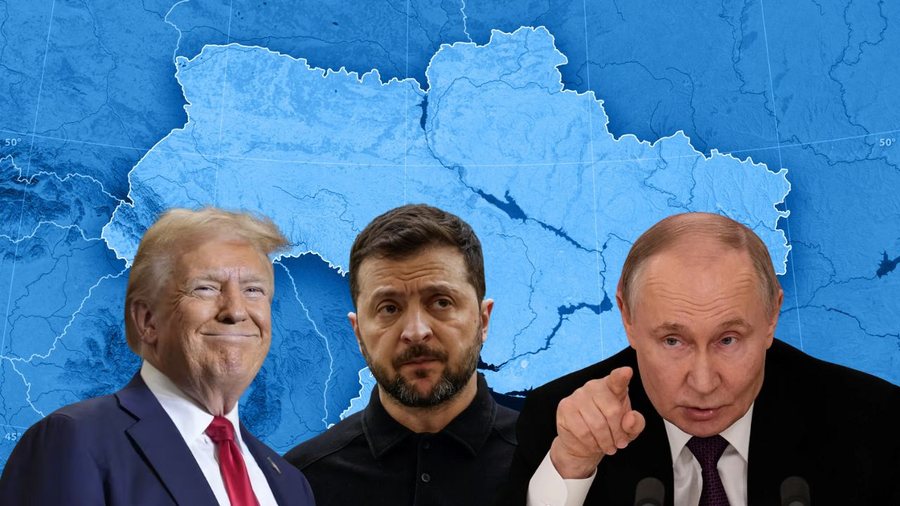
Washington and Kiev are seeking a ceasefire in the fighting between Russia and Ukraine, but Moscow is setting conditions. What interests do Ukraine, the US, the EU and Russia pursue?
Since the meeting between US and Ukrainian representatives in the Saudi city, Jeddah has held out hopes for a temporary ceasefire in Ukraine. A look at the interests of the main parties.
Russia
Russian President Vladimir Putin has made the ceasefire agreement conditional. "We agree with the proposal to stop hostilities," Putin said, thanking President Trump for the initiative. "But we believe that this stoppage should be such that it leads to a long-term peace and eliminates the causes of the conflict," Putin said at a highly anticipated press conference on Thursday (March 12).
Putin's adviser Yuri Ushakov had previously said that the ceasefire proposal was "hasty". Any peace settlement must take into account "Russia's legitimate interests" and should not serve as a "breathing pause for Ukraine".
According to experts, Moscow wants to push NATO out of Eastern Europe and its influence in Ukraine. "I don't think it's realistic for Russia to agree to any kind of deal in which Ukraine remains sovereign and independent," said a Russia expert at the SWP Science and Policy Foundation in the New York Times. He was referring to Russia's continued demands for new elections in Ukraine.
This strategy also includes the conditions that Moscow sets for the eventuality of peace talks. This includes the fact that the Kremlin has repeatedly stressed that it does not accept the stationing of foreign troops to ensure peace in Ukraine. Even Ukraine's membership in NATO is not acceptable.
There is also no prospect of the return of the annexed Ukrainian territories. On the contrary. Putin offered Trump in late February a separate agreement on the exploration of raw materials in the occupied areas. Russia is ready "to cooperate with foreign partners, including the Americans, in new regions," Putin said in a television interview.
Moscow has a vested interest in lifting Western sanctions imposed at the start of the war in Ukraine. The economic boom fueled by the war economy is fading, and the country is threatened by recession and inflation.
US
US President Donald Trump will position himself as a peace broker. He failed to keep his election promise to end the war within 24 hours today, but he has managed to increase pressure on Kiev and Moscow.
US Secretary of State Marco Rubio stated in Charlevoix, Canada, at the G7 Foreign Ministers' meeting that it would be "perfect" if the message from the meeting was "that the US has done something good for the world."
Peace would allow Trump to reduce military and humanitarian aid to Ukraine. This also fits with his plans to reduce American commitment to NATO and force European countries to increase defense spending.
The US has an interest in having access to raw materials. Ukraine possesses fossil fuels such as gas and rare minerals. For the moment, the planned agreement between Ukraine and the US after the scandal in the White House has failed. Meanwhile, President Zelensky is ready to sign it. Experts are critical, because Trump is under pressure to fulfill his promise of peace and may make major concessions to Putin.
European Union
The war in Ukraine and fears of a wider conflict have led to a shift in mindset in the EU and increased defense spending. Countries that were neutral for decades, such as Finland and Sweden, are now NATO members. Most EU member states have joined the sanctions against Russia. “We need to put Ukraine in the strongest possible position. Sanctions are a tool of pressure,” said EU foreign policy chief Kaja Kallas.
Brussels seeks to weaken Russian influence in Europe and offers Ukraine the prospect of EU membership. Ukraine is an EU candidate country from 2022.
Countries that sympathize with or cooperate with Russia include, among others, the other EU candidate, Serbia, as well as member states, Hungary, Slovakia.
ukraine
Ukrainian President Volodymyr Zelensky is ready to make concessions after massive pressure from the US. Until now, Kiev's official position was "we don't talk to Putin", and that "we will take back all the territories occupied by Russia, including Crimea and eastern Ukraine".
Meanwhile, Kiev sees it as a success that, after the scandal in the White House, American aid was restored and information exchange between intelligence services was enabled. In a possible agreement, there is also the prospect of possible security guarantees from the US.
Although a ceasefire would probably not include the return of the occupied territories, Ukraine hopes in the long term to return these territories. At the same time, Kiev is counting on continued international support to strengthen its position and ensure that pressure on Russia remains. /DW/
(A2 Televizion)











